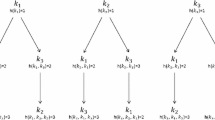Summary
Given any problem involving assignment of indivisible objects and a sum of money among individuals, there is an efficient envyfree allocation (namely the minmax money allocation) which can be extended monotonically to a new efficient envyfree allocation for any object added or individual removed, and another (the maximin value allocation) extendable similarly for any object removed or person added. Still, the efficient envyfree solution is largely incompatible with the resource and population monotonicity axioms: The minmax money and maxmin value allocations are unique in being extendable.
Similar content being viewed by others
References
Alkan, A.: Monotonicity and fair assignments. Bogaziçi University Research Paper, 1989
Alkan, A., Demange, G., Gale, D.: Fair allocation of indivisible goods and criteria of justice. Econometrica59, 1023–1039 (1991)
Dutta, B., Vohra, R.: A characterization of egalitarian equivalence. Econ. Theory3, 465–480 (1993)
Foley, D.: Resource allocation and the public sector. Yale Economic Essays 7 (1967)
Kalai, E.: Proportional solutions to bargaining situations: interpersonal utility comparisons. Econometrica45, 1623–1630 (1977)
Kalai, E., Samet, D.: Monotonie solutions to general cooperative games. Econometrica53, 307–327 (1985)
Kolm, S.C.: Justice et equite. Paris: Editions du C.N.R.S. 1972
Mo, J., Gong, J.: Second-order conditions in game theory. The Institute of Economics, Discussion Paper, Taiwan, 1990
Moulin, H.: An application of the Shapley value to fair division with money. Econometrica6, 1330–1349 (1992)
Moulin, H., Thomson, W.: Can everyone benefit from growth? Two difficulties. J. Math. Econ. 339–345 (1988)
Roemer, J.: The mismarriage of bargaining theory and distributive justice. Ethics97, 88–110 (1986)
Sprumont, Y.: Axiomatizing ordinal welfare egalitarianism when preferences vary. Université de Montreal, mimeo, 1992
Svensson, L.G.: Large indivisibles: an analysis with respect to price equilibrium and fairness. Econometrica51, 939–954 (1983)
Tadenuma, K., Thomson, W.: The fair allocation of an indivisible good when monetary compensations are possible. Math. Soc. Sci.25, 117–132 (1993)
Thomson, W.: The fair division of a fixed supply among a growing population. Math. Oper. Res.8, 319–326 (1983)
Thomson, W.: Equity concepts in economics. University of Rochester, mimeo, 1990
Author information
Authors and Affiliations
Additional information
I wish to thank William Thomson, David Gale, Ehud Kalai and a referee for valuable suggestions. Previous versions have appeared in the discussion paper series of CORE, Universite Catholique de Louvain, and CEME, Universite Libre de Brussels; to both of these centers I extend my thanks for the visit I enjoyed in 1992. I also gratefully acknowledge support from the Bogaziçi University Research Fund.
Rights and permissions
About this article
Cite this article
Alkan, A. Monotonicity and envyfree assignments. Econ Theory 4, 605–616 (1994). https://doi.org/10.1007/BF01213627
Received:
Revised:
Issue Date:
DOI: https://doi.org/10.1007/BF01213627




